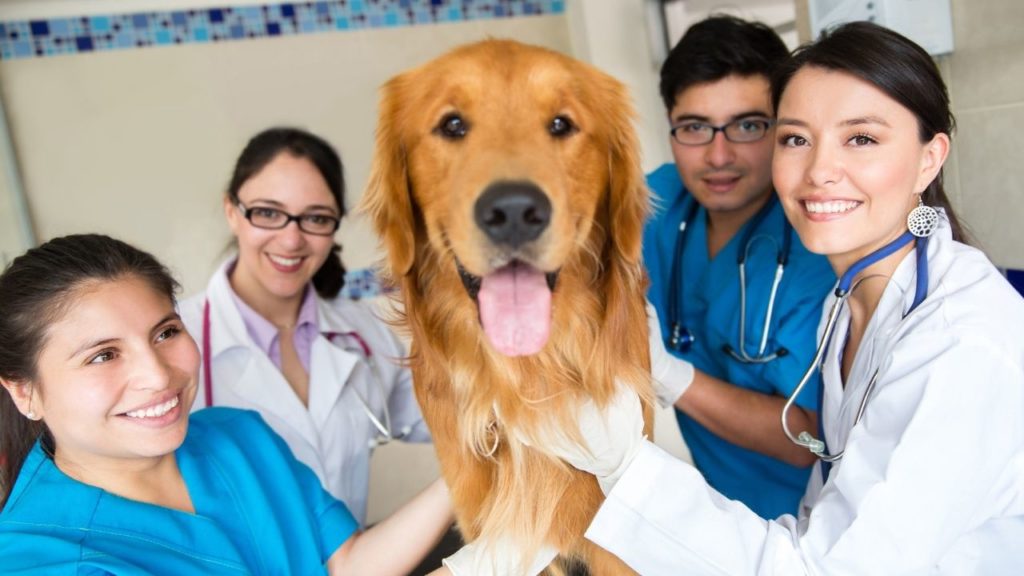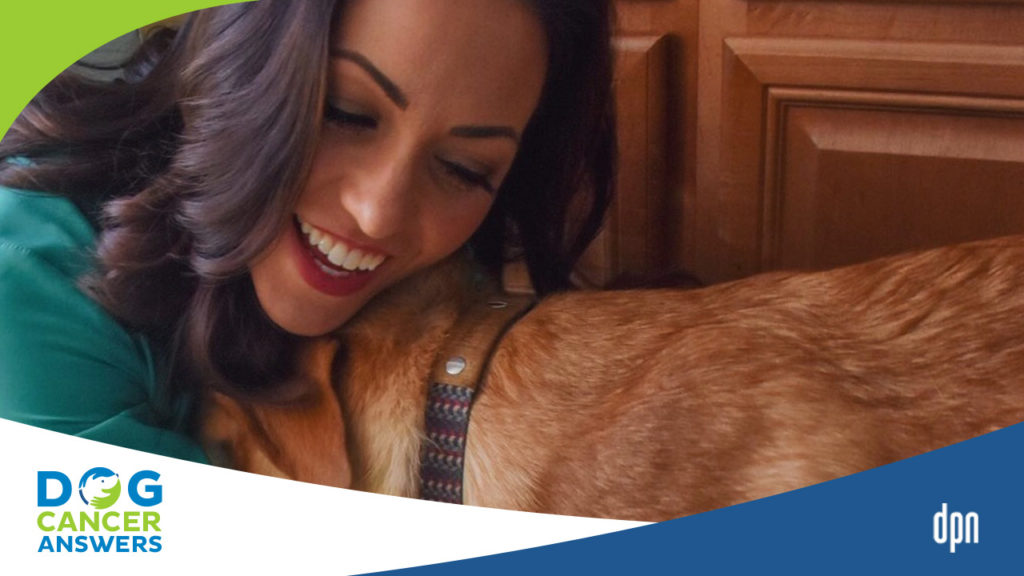Holistic Veterinarians and Cancer
Consulting a holistic veterinarian, or an integrative veterinarian, can provide some insight into non-traditional treatments, which may support more traditional medical treatments or quality of life.
Key Takeaways
- Holistic medicine works for cancer treatment, with goals and results varying on the type and stage of cancer. Typically, the main goal is living a good quality of life, despite cancer.
- Holistic veterinarians treat the whole pet and get down to the deeper root cause of the issue.
- Holistic veterinarians treat a dog’s physical and mental health with what is considered alternative therapies: nutrition, exercise, cognitive therapy, acupuncture, herbs, supplements, etc.
- Getting a second opinion from an oncologist and a holistic or integrative veterinarian is highly recommended. This will give you excellent advice on all the available treatment options, and help you ensure you are on the right path for you and your dog.
- Holistic veterinarians, integrative veterinarians, and oncologists often work together to help dogs fight and cope with cancer. Their perspectives may differ, but they respect each other as colleagues and medical professionals.
What is a Holistic Vet?
You might not think holistic veterinarians and cancer go together, but you’d be wrong. According to the American Holistic Veterinary Medical Association, holistic veterinary medicine considers a patient’s body, mind, and spirit when approaching disease treatment and optimum health.1
What could be more important than that when facing cancer, and knowing you might be nearing the end of your dog’s life? The association further fleshes out this idea as follows:1
“Holistic veterinary medicine is a form of healing that considers the whole patient–body, mind, and spirit–in its approach to achieving optimum health and eliminating the root causes of disease. The holistic approach is gentle, minimally invasive, and incorporates patient emotions and well-being. Holistic thinking is centered on love, empathy, and respect.”
This means holistic therapies may target nutrition, reducing stress, maintaining mobility, and immune system support in addition to treating the primary disease.
Many conventional veterinarians resonate with this approach in general, as well. The practice of veterinary medicine, in general, is becoming more integrative as we learn how what used to be considered “alternative” medicine helps maintain health.
Dr. Katie Woodley made a big jump to integrative medicine. She shares her story with DOG CANCER ANSWERS.
What’s the Difference Between a Holistic, Integrative, and Conventional Veterinarian?
There is not always a clear distinction between a “holistic veterinarian” and a “conventional veterinarian” because both types will often recommend a combination of conventional treatments (such as surgery, chemotherapy, and pharmaceuticals) and also complimentary or alternative treatments, such as acupuncture, traditional Chinese veterinary medicine, and chiropractic care.
The Lines Are Blurring
Many treatments once considered “holistic” are now commonly found in more traditional hospitals, including laser therapy, physical rehabilitation, stem cell therapy, and fecal transplants.
Many conventional veterinary schools are teaching what was once considered “holistic medicine,” so conventional general practice veterinarians may now be more holistically minded than ever before.
Like human medicine, veterinary medicine is becoming more integrative in its approach.
Every general practitioner veterinarian has their own medical preferences and skill sets, as do holistic and integrative veterinarians.
It’s always a good idea to ask veterinarians what types of medicine they are trained for and practice, whether conventional, integrative, or holistic!
Holistic Veterinarians and Cancer
Veterinarians who consider themselves purely holistic generally use alternative medicine with no pharmaceuticals.
Most holistic veterinarians require you to have a general practice veterinarian as part of your team so that they can handle issues that require pharmaceuticals, chemotherapy, and other more conventional treatments.
Integrative Veterinarians
A veterinarian practicing integrative medicine typically uses tools available in both conventional and holistic medicine.
For example, an integrative veterinarian can do everything a general practitioner does: surgery, dental cleanings, radiographs, diagnostics, prescribing pharmaceuticals if needed, etc.
They also practice holistic medicine. Depending upon their training, certification, and areas of interest, they might practice ozone therapy, Chinese herbal medicine, western herbal medicine, homeopathy, fecal transplants, acupuncture, manual therapy (also known as chiropractic), flower essences, rehabilitation therapy, and more.
Veterinary Certifications for Holistic Medicine
For certain therapies, veterinarians must undergo additional training and pass testing to be “Certified.” These certifications are often displayed as additional initials after the doctorate (after the DVM or VMD).
For example, a veterinarian certified in veterinary acupuncture will have CVA listed after their name. That stands for “Certified in Veterinary Acupuncture.”
A veterinarian with CVSMT after their name is certified as well. Those initials are “Certified in Veterinary Spinal Manipulation Therapy” (commonly known as chiropractic, although most states reserve that term only for human chiropractic practitioners).
There are many other certifications. If you wonder what they mean, a quick internet search can tell you, or you can ask the veterinarian directly.
Other Ways to Get Experience and Training in Holistic Medicine
While certifications are available for some therapies, that’s not true for every “outside the box” medical approach. There are modalities in holistic medicine that do not have certification options available.
Even for modalities with certification options, veterinarians sometimes practice medicine without going through a formal process.
For example, a veterinarian can practice acupuncture, herbs, etc., even if not certified. Perhaps they went through the course but have not finished the testing yet. They can still practice that modality and help dogs and other animals with their knowledge.
Or perhaps they have learned from a proficient and experienced mentor so that they received the equivalent of certification (or perhaps more). In that case, paying for courses that wouldn’t add to their learning or experience might seem like a waste of time and money better spent on staff and other expenses in their business.
Perhaps they have learned through continuing education courses or books that don’t offer certification.
Non-Veterinary Practitioners
It is very important to know that every holistic veterinarian underwent the same veterinary medical training as conventional and integrative veterinarians. Veterinarians of every practice specialty and interest have the same foundation of medical knowledge.
Practitioners who did not attend veterinary school almost certainly lack all that knowledge. Human medical practitioners may have some understanding of the same information. Still, they do not know the ins and outs of veterinary medicine, just like veterinarians don’t know the ins and outs of human medicine.
This is why veterinarians are the only practitioners allowed to practice veterinary holistic/integrative medicine independently.
Even the best human practitioners do not have the knowledge veterinarians get in veterinary school about animals.
If a practitioner is not a veterinarian, they must work directly under veterinarian supervision. This happens often, and your veterinarian may refer you to a non-veterinarian holistic practitioner that they consult with, trust, and provide medical supervision.
However, some holistic practitioners believe their experience with humans, or their instinctive or intuitive understanding, is enough to practice animal medicine. It’s important to remember that they did not complete the rigorous training of four years of veterinary school. They might not be aware of how much they don’t know about all the differences between animal species and humans. Every species is different.
If you use a non-veterinary medical practitioner or practice, please inform your veterinarian about it. They will likely be happy to review and provide tweaks and suggestions to make the modality appropriate and maybe even improve it.
Choosing the Right Vet(s) for Your Dog
Veterinary medicine can include various therapy approaches, especially when treating and managing cancer. It can range from a strict holistic approach to a completely traditional one, anywhere between.
In general, veterinarians are embracing more and more “outside the box” strategies as they see their clients using them with their patients.
Dr. Judy Morgan has fantastic advice about how to find the best veterinarian for your dog in this episode of DOG CANCER ANSWERS.
What Do YOU Want?
Some owners have powerful beliefs about what therapies they want to embrace. They may base their beliefs on personal experience, prior experience with another pet, or individual beliefs.
Whatever your beliefs about medicine are, be brave and share them with your veterinarian. Veterinarians find it extremely helpful to understand a client’s motivations and goals for their dog so they can help develop the best plan for that individual dog.
After all, you must do what is right for you and your dog. What path is going to allow you to sleep tonight?
It might be conventional medicine only, holistic medicine only, or integrative medicine.
And sometimes, you do not know what path you want to take until you research the different options.
Sometimes you start down one path and then realize it’s not right for you and your dog. In these cases, there is no shame in changing paths.
Whatever your initial choices are, cancer is bound to force you to make some changes. It adapts and is sneaky; nearly every plan gets tweaked, from chemotherapy protocols to surgeries to supplement strategies.
How Do You Fit?
Not every veterinarian is a good fit for every person. There is a saying that there is a “lid for every pot,” which is also true in medicine. There is no one-size-fits-all cancer plan, and there is no one-size-fits-all veterinarian.
Falling in love with your veterinarian is probably unnecessary, but liking and trusting them is. And if you don’t, that doesn’t mean they are a bad veterinarian or you are a bad client. It sometimes just takes a little while to find the right fit.
Your goals and wishes must align with how your veterinarian practices (or wishes to practice) medicine. This is why being upfront about any strongly held beliefs is so important.
Trust is the most important thing in your relationship with your veterinarian(s). If you trust your veterinarian to make their very best recommendations, and they trust you to be open-minded, you will make a great team.
Talking to Your Vet About Adding a Holistic Vet
To learn more about holistic veterinary medicine treatment options, asking your primary veterinarian is the best place to start.
Your Veterinarian Might Be More Holistic Than You Thought
For one, they may already offer some options you don’t know about. Not every veterinarian advertises themselves up front as “holistic,” and many veterinarians consider themselves integrative without necessarily talking about their practice that way.
By asking those questions, they know that holistic medicine is something you are interested in, and they can tell you about their holistic treatments.
Your Veterinarian Can Make a Trusted Referral
If they do not practice holistic medicine, they likely have a holistic or integrative veterinarian they can refer you to. Veterinary medicine is collaborative, and veterinarians share knowledge freely and often. Most veterinarians know which colleagues they trust to provide you and your dog with excellent medical care.
Your Veterinarian Can Refer to a More Holistically-Minded Oncologist
This is also true for veterinary specialists, such as veterinary oncologists. You might assume that oncologists who administer chemotherapy all day are dismissive of holistic medicine, but that is often not the case.
Integrative veterinarians develop strong relationships with other veterinarians. Large referral specialty centers are often a source of referrals for holistic veterinarians. Once veterinarians have worked with a holistic or integrative veterinarian who provides good care, communicates well, and shares mutual respect, a level of comfort is well-established.
In short, do not be afraid to ask any veterinarian on your team to refer you to a holistic or integrative veterinarian.
Think all oncologists are just drug-pushers? Meet Dr. Kendra Pope in this episode of DOG CANCER ANSWERS.
The Importance of Telling Every Vet Everything
A lot of pet owners have more than one veterinarian these days. It is much more common now than ever, with veterinary offices being booked further out.
Alternative, holistic, or integrative medicine is much more common and accepted these days and not seen as farfetched or scary. Veterinarians of different fields and specialties are used to consulting with one another about a mutual client. This is critical to providing good care.
Share Records Freely
Your job as the dog’s guardian is to make sure everyone is in the loop and knows about medications, supplements, etc. Make sure records get sent to every veterinarian to keep everyone updated.
Share Supplements and Diet Strategies
It is important to be transparent with all the veterinarians involved in treating your dog about what medications, supplements, and treatments are used. Not divulging this information is potentially dangerous to your dog due to interactions or other problems that can arise.
But keeping your veterinarians in the dark also limits the ability of all of your veterinarians to make the best recommendations for your dog that fit with your treatment goals as their owner.
Trust Your Veterinarians; It Helps Your Dog
Being clear about your goals, wishes, and intentions for your dog helps your entire team get your dog the care you expect and your dog deserves. Good veterinarians do not object to working with colleagues and dog lovers to achieve the best outcomes, especially when there is a foundation of mutual respect and clear communication.
- What is Holistic Veterinary Medicine? American Holistic Veterinary Medical Association. Accessed June 20, 2023. https://www.ahvma.org/what-is-holistic-veterinary-medicine/.
Topics
Did You Find This Helpful? Share It with Your Pack!
Use the buttons to share what you learned on social media, download a PDF, print this out, or email it to your veterinarian.









